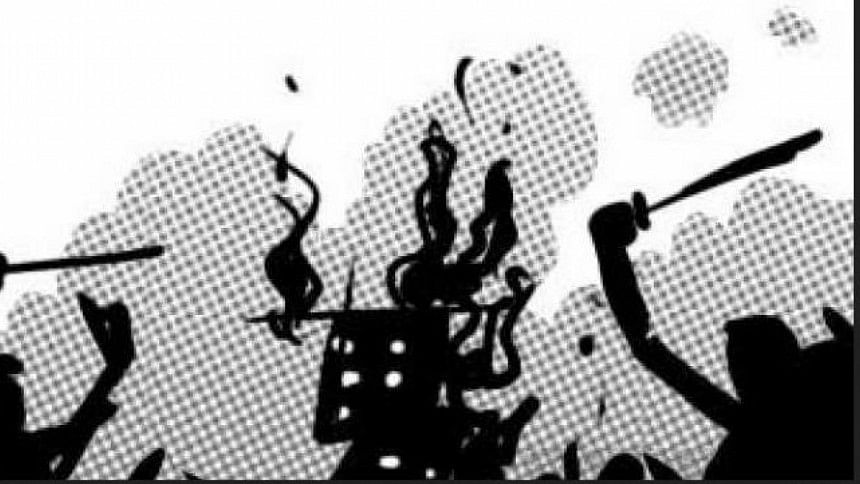Tackling the shameful bigotry

Even the greatest cynic would agree that the attacks on the minority Hindu population and their properties and places of worship, though intermittent, have been a blight on the democratic and secular credentials of Bangladeshi polity. The sad reality is that even after forty five years of republican and pluralistic existence, the Hindu religious minority of Bangladesh have not been able to save themselves from the bigoted attacks of mischievous rowdies, howsoever small they may be in number.
The recent attack on Hindu homes and temples in Brahmanbaria is reportedly under enquiry by different bodies. There are divergent views about the identity and motive of the perpetrators. While some quarters have portrayed the attack as planned with a view to grabbing property, others have played down the looting of Hindu houses. The unfortunate dimension of the incident is that enquiries and promises to ensure security will not be able to really comfort the badly bruised psyche of the victims for a considerable length of time. The dejected and forlorn look of a Hindu woman sitting in her vandalised home in Kashipara of Brahmanbaria's Nasirnagar Upazila, as it appeared on the front page of this newspaper on November 3, is a poignant reminder of that state of affairs.
Upon scrutiny of the ground situation one might say that it is time to find out why the number of Hindus has decreased over the years, particularly since the creation of People's Republic of Bangladesh in 1971. Has our policy been the same as it was when we were part of Islamic Republic of Pakistan? Has the mindset of the majority community really changed for establishing the ethos of an equal rights society?
We in Bangladesh need to ask whether it is religion per se or the politicisation of religious identity and the mobilisation of this identity for community and state ends that have resulted in communal violence. We also need to find out whether the emphasis is on contests for power and resources. Have the recent incidents as mentioned occurred with the acquiescence of the administration?
Coming to specifics, in Bangladesh, why do we continue to witness attacks on Hindu properties? Is creation of hatred a ploy for some of the majority Muslim politicians and influential people to grab land owned by Hindus? The alleged but not yet conclusively established posting of derogatory materials on Facebook, as a pretext to vandalise Hindu homes and places of worship, quite clearly indicates the malafide intention of terrorising and dislocating the vulnerable minority. Simple common sense tells us that the ferocity of attack on Hindu communities is caused by the victims' weakness and the perpetrators' suspected immunity from the process of law. Are the patrons of the mischief-makers too powerful to be dislodged?
The immediate imperative, under the circumstances, is to effectively deactivate the vultures that are on the watch to grab the lands and properties of panicked Hindus. This requires political will and stern administrative measures for ensuring continued security. However, beyond that, the minorities need to politically organise themselves in such a manner that in course of time, issues of their honourable existence become a focus of mainstream politics. Such course of action is expected to provide substantial relief.
The politicians cannot be part of a deliberate effort to realign state and cultural power in the interest of the majority because that will result in non-Muslim minorities being defined explicitly or implicitly as second class citizens of Bangladesh. The flowering of a nation demands proactive action from the State.
Let us remember that the scripture of the Muslims, the Holy Qur'an, gives them a mission: to create a just and decent society in which all members are to be treated with respect. To cultivate an inaccurate prejudice damages the tolerance, liberality, and compassion that are supposed to characterise Islamic culture. Quite clearly, we cannot defend a liberal principle by reviving a medieval prejudice.
The Prophet of Islam (PBUH), from the very beginning, was opposed to the jahili arrogance and egotism that not only fuelled the aggression of his time but is much in evidence in present-day world. The religion of the Muslims - "Islam"- signifies peace and reconciliation. Finally, let us bear in mind that the concept of "Ummah" in the historic Medina Charter included all faiths.
The writer is a columnist of The Daily Star.

 For all latest news, follow The Daily Star's Google News channel.
For all latest news, follow The Daily Star's Google News channel. 



Comments